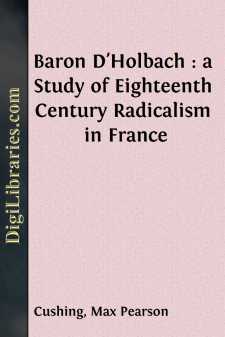Categories
- Antiques & Collectibles 13
- Architecture 36
- Art 48
- Bibles 22
- Biography & Autobiography 813
- Body, Mind & Spirit 142
- Business & Economics 28
- Children's Books 15
- Children's Fiction 12
- Computers 4
- Cooking 94
- Crafts & Hobbies 4
- Drama 346
- Education 46
- Family & Relationships 57
- Fiction 11829
- Games 19
- Gardening 17
- Health & Fitness 34
- History 1377
- House & Home 1
- Humor 147
- Juvenile Fiction 1873
- Juvenile Nonfiction 202
- Language Arts & Disciplines 88
- Law 16
- Literary Collections 686
- Literary Criticism 179
- Mathematics 13
- Medical 41
- Music 40
- Nature 179
- Non-Classifiable 1768
- Performing Arts 7
- Periodicals 1453
- Philosophy 64
- Photography 2
- Poetry 896
- Political Science 203
- Psychology 42
- Reference 154
- Religion 513
- Science 126
- Self-Help 84
- Social Science 81
- Sports & Recreation 34
- Study Aids 3
- Technology & Engineering 59
- Transportation 23
- Travel 463
- True Crime 29
Baron D'Holbach : a Study of Eighteenth Century Radicalism in France
Description:
Excerpt
INTRODUCTION
Diderot, writing to the Princess Dashkoff in 1771, thus analysed the spirit of his century:
Chaque siècle a son esprit qui le caractérise. L'esprit du nôtre semble être celui de la liberté. La première attaque contre la superstition a été violente, sans mesure. Une fois que les hommes ont osé d'une manière quelconque donner l'assaut à la barrière de la religion, cette barrière la plus formidable qui existe comme la plus respectée, il est impossible de s'arrêter. Dès qu'ils ont tourné des regards menaçants contre la majesté du ciel, ils ne manqueront pas le moment d'après de les diriger contre la souveraineté de la terre. Le câble qui tient et comprime l'humanité est formé de deux cordes, l'une ne peut céder sans que l'autre vienne à rompre. [Endnote 1:1]
The following study proposes to deal with this attack on religion that preceded and helped to prepare the French Revolution. Similar phenomena are by no means rare in the annals of history; eighteenth-century atheism, however, is of especial interest, standing as it does at the end of a long period of theological and ecclesiastical disintegration and prophesying a reconstruction of society on a purely rational and naturalistic basis. The anti-theistic movement has been so obscured by the less thoroughgoing tendency of deism and by subsequent romanticism that the real issue in the eighteenth century has been largely lost from view. Hence it has seemed fit to center this study about the man who stated the situation with the most unmistakable and uncompromising clearness, and who still occupies a unique though obscure position in the history of thought.
Holbach has been very much neglected by writers on the eighteenth century. He has no biographer. M. Walferdin wrote (in an edition of Diderot's Works, Paris, 1821, Vol. XII p. 115): "Nous nous occupons depuis longtemps à rassembler les matériaux qui doivent servir à venger la mémoire du philosophe de la patrie de Leibnitz, et dans l'ouvrage que nous nous proposons de publier sous le titre "D'Holbach jugé par ses contemporains" nous espérons faire justement apprécier ce savant si estimable par la profondeur et la variété de ses connaissances, si précieux à sa famille et à ses amis par la pureté et la simplicité de ses moeurs, en qui la vertu était devenue une habitude et la bienfaisance un besoin." This work has never appeared and M. Tourneux thinks that nothing of it was found among M. Walferdin's papers. [2:2] In 1834 Mr. James Watson published in an English translation of the Système de la Nature, A Short Sketch of the Life and the Writings of Baron d'Holbach by Mr. Julian Hibbert, compiled especially for that edition from Saint Saurin's article in Michaud's Biographie Universelle (Paris, 1817, Vol. XX, pp. 460-467), from Barbier's Dict. des ouvrages anonymes (Paris, 1822) and from the preface to the Paris edition of the Système de la Nature (4 vols., 18mo, 1821). This sketch was later published separately (London, 1834, 12mo, pp....


